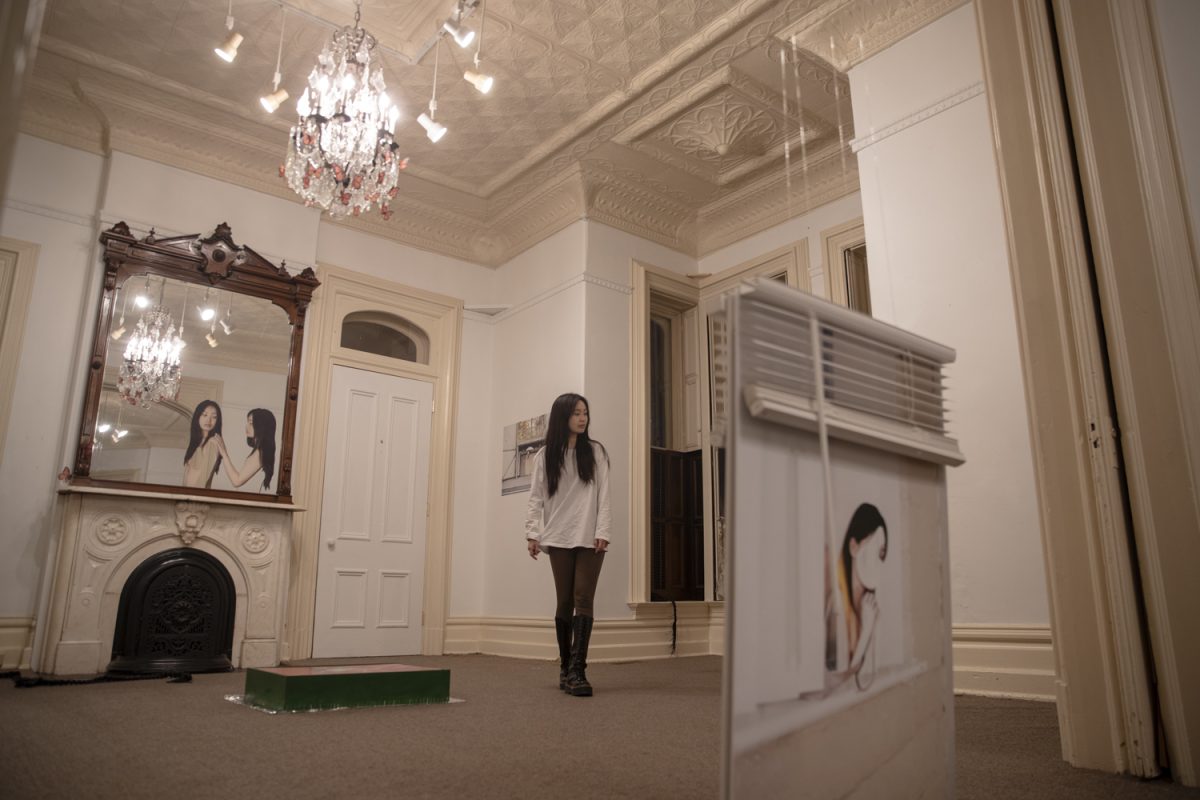“The outhouse is pretty neat, but someday, I’m probably gonna get me some indoor plumbing,” William Whitmore said. “It’s one of my long-term goals.”
It’s fitting that the cabin of the Iowa City music fixture is equipped with only an outhouse. The Lee County singer/songwriter, who still lives at the southeastern Iowan farm on which he was raised, is known for combining dusty, whiskey-infused vocals with a turn-of-the-century banjo to create a distinctly modern throwback to antique Americana.
This weekend, the 30-year-old will bring his self-labeled “rustic soul” sound to the Picador, 330 E. Washington St., for a special two-night engagement. Saturday’s set will kick off at 9 p.m. with (ft) the Shadow Government and T Wehrle. The Feb. 22 all-ages performance, featuring the musical act Hagan Myer presents the Coyote Club Vaudeville Extravaganza, will begin at 6 p.m.
“I love playing Iowa City. It’s where I cut my teeth and jumped into the music scene,” Whitmore said. “I met some of my greatest musical allies [in Iowa City], my good friend Dave Zollo — always a guy I looked up to — Greg Brown, Joe Price, and Bo Ramsey. Those are kind of the old-school guys who paved the way for a guy like me. I’m just honored to be considered a part of the scene. I think we’ve got something pretty special here.”
And he should know. His humble persona and celebrated Iowa City performances have earned him a small army of devotees and critical acclaim throughout the community since his first full-length album, Hymns for the Hopeless, was released in 2003.
“I’m proud that such a talented and unique artist was raised here,” said UI sophomore and Whitmore fan Marielle Redington. “[Whitmore] encompasses the rich Iowa history, singing about the Mississippi River and the farmland, and connects country and folk music with biblical themes while evoking images of America’s blues roots … His music is so addicting you just want to keep listening to it.”
KRUI general manager Nathan Gould said he anticipates Whitmore’s new album, Animals in the Dark, to generate a whole new wave of fans.
“Animals in the Dark has charted No. 1 this past week at KRUI,” he said. “There was been quite a buzz on both the Internet and throughout the station. Personally, I really like the new album … Whitmore is a great representation for all the good music here in Iowa.”
His début album with the ANTI-label (known for such diverse artists as Mavis Staples, Nick Cave, the Bad Seeds, and Eddie Izard), Animals in the Dark differs from Whitmore’s prior releases in its overtly political nature.
“My previous work was very inward and was my way to heal certain wounds. And to be honest, after those records were done, I didn’t think I’d make any more. I thought I’d go back to being a carpenter, and I had said everything I had to say,” he said. “But as I looked around and started to become more aware of the world, I became more and more angry … When I’d travel the world, I had to be ashamed to be American for a while. We’re a great country with great people; it’s just the people in power left us with a black eye, and so it was all these thoughts that lead to me saying, ‘I’m sick of this — I want mutiny on this ship.’ ”
And on Animals in the Dark, he does just that. The disc opens with “Mutiny,” a rousing demand for rebellion set in call-and-response style over a pulsating, militaristic drum roll. The rest of the album incorporates his signature banjo and ecological metaphors with his newfound political mindset, creating a one-of-a-kind call to action that encourages self-examination and environmental awareness.
“When I say, ‘The old devils are at it again / it’s true right now as it was back then’ [in ‘Old Devils’], I’m equating these times to Caesar himself, the Kaiser, all these figures throughout history who’ve had their hands around our throat from behind closed doors,” Whitmore said. “Now, this is obviously applicable to George Bush and Donald Rumsfeld, but it’s more than that … The new record does have some political themes, but I try to equate them to something universal and try to get beyond politics to the true mythos of human nature and how as human beings, we’re flawed creatures.”
He will perform songs from Animals in the Dark, released this earlier week, at his performances this weekend.
“If you’ve never been to a show of mine, you can expect to see me and a lot of people havin’ a lot of fun, you can expect a lot of booze to be flowin’, and you can expect to see me playin’ my heart out,” he said. “The camaraderie is what I really enjoy — that people can come together even in these difficult times. These are not the worst of times, these are the best of times. These are the times we need to get together, and enjoy each other’s company, and share our ideas, and have fun. That’s the best thing about life.”
UI graduate student Matt Mettler attested to the solidarity between artist and audience by recalling a free live performance by Whitmore several years ago at the Record Collector, now at 116 S. Linn St.
“[Whitmore] came in about 10 minutes late [for the show] in a sleeveless shirt with a few friends and an open bottle of Jack Daniel’s,” Mettler said. “As he set up the banjo, he took a swig and passed it out to the audience members, encouraging them to try the drink. He took requests and talked with the audience quite a bit, and the crowd passed the bottle throughout the show, which was great.”
“I saw [Whitmore] in Chicago when I was on a break from school when I was a freshman, and I loved his performance so much I decided to send him a letter to thank him for a great show and encourage him to keep up the good work,” Johannensen said. “About a week later, I received a handwritten postcard from him thanking me for the letter.”
Whitmore’s commitment to his fans can be traced back to his “Iowa pride.”
“I think there are things we have in Iowa that are unlike anywhere else,” he said. “Every place is unique in its people and culture, but the Midwest just has something a little different. It’s a work ethic, it’s an attitude, it’s a way of life … living and working on a farm — shoveling horse manure, and building fences, and gathering eggs every day — shaped who I am and how I see the world … I’m here to speak for us.”






